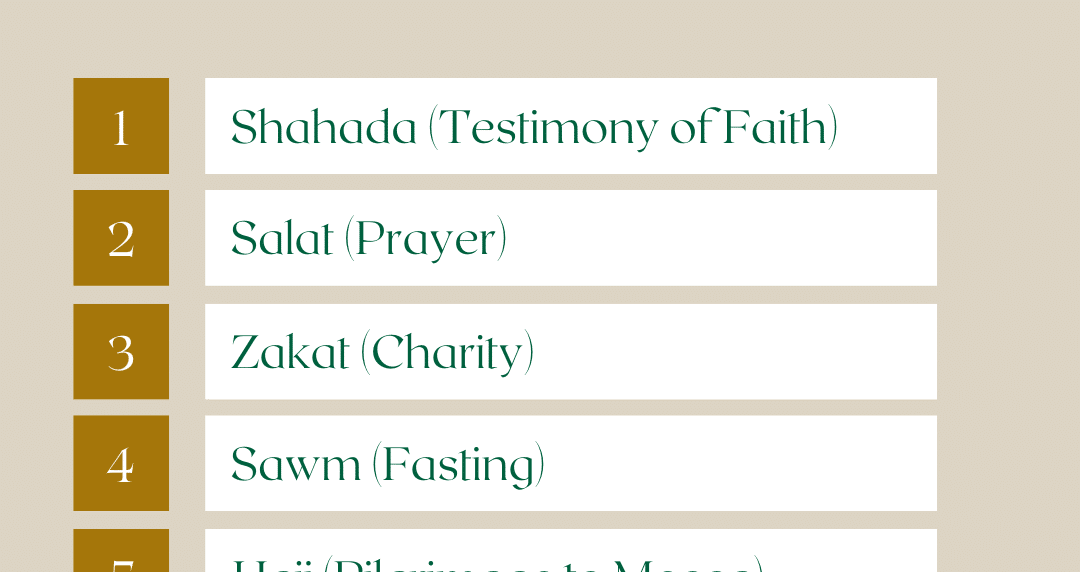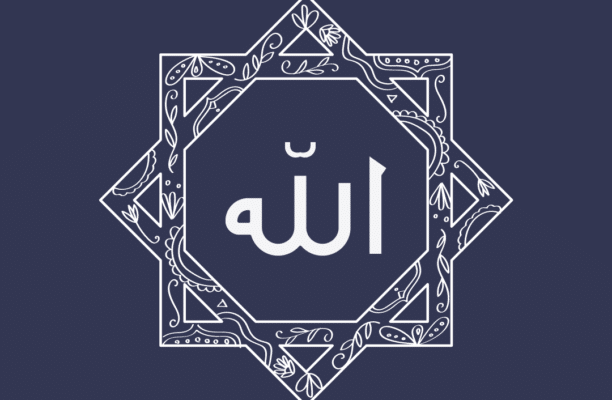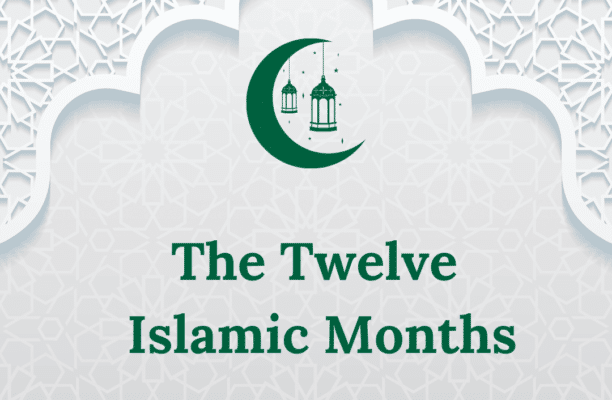The 5 pillars of Islam aren’t just building blocks for a religion. They’re a roadmap to a meaningful, fulfilling life. Ever wonder what they are? They’re simple but powerful: Shahadah, prayer, charity, fasting, and pilgrimage. These pillars aren’t just rules – they’re ways Muslims connect with their faith, promote goodness in the world, and find personal growth. Get ready to dive deep into what each one means and why they’re so important. Don’t worry, it’s easier than you think. And who knows, you might even find a nugget of wisdom to apply in your own life. Let’s get started!
Overview of Islam
Islam is one of the major religions in the world, with over 1.8 billion followers globally. It is based on the teachings of the Prophet Muhammad (pbuh), who lived in the 7th century CE. Islam is centered around the belief in one God, known as Allah, and the guidance provided through the Quran, the holy book of Islam.
What is Islam?
Islam, which means “submission to God,” is a comprehensive way of life that encompasses various aspects, including faith, worship, ethics, and social norms. Muslims, the followers of Islam, strive to live their lives in accordance with the teachings of the Quran and the example set by the Prophet Muhammad (pbuh).
One of the fundamental beliefs in Islam is the concept of monotheism, the belief in the oneness of God. Muslims believe that there is no deity worthy of worship except Allah, and they devote their lives to serving and obeying Him.
Importance of the 5 Pillars of Islam
The 5 pillars of Islam are the essential acts of worship that form the foundation of a Muslim’s faith. They are:
- Shahada (Testimony of Faith): This is the declaration of faith that every Muslim must make. It consists of the phrase “Achhado Ana La ilaha illallah Ila Allah, Wahdaho La Sharika Lah, Wa Achhado Ana Muhammadun rasulu Allah,” which means “There is no god but Allah, and Muhammad is the messenger of Allah.” By reciting the Shahada, a person becomes a Muslim.
- Salat (Prayer): Muslims are required to perform five daily prayers, known as Salah. These prayers are performed at specific times throughout the day and involve physical movements, such as bowing and prostrating, while reciting verses from the Quran. Prayer serves as a direct form of communication between the individual and Allah.
- Zakat (Charity): Zakat is the obligatory giving of a portion of one’s wealth to those in need. It is seen as a means of purifying one’s wealth and helping to alleviate poverty and inequality in society. Muslims are encouraged to give a specified percentage of their income and assets to the less fortunate.
- Sawm (Fasting): Fasting during the month of Ramadan is considered one of the most important acts of worship in Islam. Muslims abstain from eating, drinking, and other physical needs from dawn until sunset. Fasting is a way to develop self-discipline, empathy for those less fortunate, and a deeper connection with Allah.
- Hajj (Pilgrimage to Mecca): Hajj is the pilgrimage to the holy city of Mecca in Saudi Arabia, which every able-bodied and financially capable Muslim is required to undertake at least once in their lifetime. It involves a series of rituals performed over several days, culminating in the circumambulation of the Kaaba, the sacred structure at the center of the Grand Mosque.
The 5 pillars of Islam are not just rituals but encompass the core values and principles of the religion. They serve as a means of strengthening the individual’s faith and fostering a sense of unity and community among Muslims worldwide.
Pillar 1: Shahada
The first pillar of Islam is Shahada, which holds great significance in the Muslim faith. Let’s dive into the meaning of Shahada and explore its importance to Muslims.
Meaning of Shahada
Shahada, also known as the declaration of faith, is a fundamental belief in the oneness of Allah and the prophethood of Muhammad (pbuh). It is a concise statement that every Muslim recites to affirm their commitment to Islam. The Shahada goes as follows:
“Achhado Ana La ilaha illallah Ila Allah, Wahdaho La Sharika Lah, Wa Achhado Ana Muhammadun rasulu Allah.”
This powerful Arabic phrase translates to “There is no god but Allah, and Muhammad is the messenger of Allah.” By uttering these words, a person formally declares their acceptance of Islam and acknowledges Allah as the one true God.
Significance of Shahada in Islam
The Shahada holds immense significance in the Islamic faith. It serves as the foundation upon which a Muslim’s beliefs and actions are built. Let’s explore why Shahada is so crucial to Muslims:
- Monotheism: The Shahada affirms the belief in the oneness of Allah. It emphasizes the Islamic principle of monotheism, which stands at the core of the religion. Muslims believe in the uniqueness and absolute sovereignty of Allah, rejecting the worship of any other deity.
- Prophethood: The second part of the Shahada acknowledges the prophethood of Muhammad (pbuh). Muslims believe that Muhammad (pbuh) is the final messenger sent by Allah to guide humanity. By accepting Muhammad (pbuh) as the last prophet, Muslims commit to following his teachings and emulating his character.
- Entry into Islam: Reciting the Shahada is the formal entry point into the Islamic faith. It marks the beginning of a person’s journey as a Muslim and signifies their submission to Allah. The Shahada is often recited during the conversion process, symbolizing the individual’s acceptance of Islam.
- Unity among Muslims: The Shahada serves as a unifying factor for the global Muslim community. Regardless of their ethnic or cultural backgrounds, Muslims all around the world share a common belief in the Shahada. This declaration of faith strengthens the bond between Muslims and fosters a sense of unity and solidarity.
- Daily Reminder: Muslims frequently recite the Shahada in their daily prayers and various religious rituals. This constant repetition serves as a reminder of their commitment to Islam and reinforces their spiritual connection with Allah.
Pillar 2: Salah – The Meaning and Purpose of Prayer
What is Salah?
Salah, also known as prayer, is the second pillar of Islam. It plays a central role in the lives of Muslims as it is considered a direct means of communication with Allah (God). Salah is not just a physical act, but a spiritual practice that strengthens the bond between the individual and their Creator.
How and When Muslims Pray
Muslims are required to pray five times a day, known as the five daily prayers or Salah. These prayers are performed at specific times throughout the day: Fajr (dawn), Dhuhr (midday), Asr (afternoon), Maghrib (sunset), and Isha (night).
To begin the prayer, Muslims perform ablution, a ritual cleansing of the body. This includes washing the hands, face, arms, and feet, symbolizing purification and readiness for prayer. A clean and tranquil environment is preferred, so Muslims often find a quiet place, away from distractions, to focus on their worship.
The prayer itself consists of a series of physical movements and recitations. Muslims stand, bow, prostrate, and sit during different parts of the prayer, all while reciting verses from the Quran. This rhythmic and meditative process helps Muslims to center their thoughts and connect with the Divine.
The prayer is led by an imam in a mosque during congregational prayers, but Muslims can also pray individually wherever they are. The act of prayer serves as a constant reminder of the presence of Allah in their lives, fostering a sense of gratitude, humility, and spiritual growth.
Why is Salah Important?
Salah holds great significance in the Islamic faith for several reasons. Firstly, it serves as a constant reminder of the purpose of life, which is to worship and submit to Allah. Prayer helps Muslims to maintain focus on their spiritual journey, even amidst the distractions and challenges of daily life.
Secondly, Salah acts as a means of seeking forgiveness and earning rewards from Allah. Muslims believe that through sincere prayer, they can seek forgiveness for their sins and repent for any wrongdoings. It is an opportunity to ask for guidance, strength, and blessings from Allah.
Furthermore, Salah promotes discipline and self-control. By praying at specific times throughout the day, Muslims establish a routine that helps them to prioritize their spiritual well-being. It encourages time management and fosters a sense of balance between worldly matters and devotion to Allah.
Lastly, Salah creates a sense of unity among Muslims. When Muslims pray together in congregation, they stand shoulder to shoulder, regardless of their social status, race, or nationality. This practice reinforces the notion of equality and brotherhood within the Muslim community, emphasizing the importance of unity and solidarity.
In conclusion, Salah is an integral part of the Islamic faith, serving as a means of spiritual connection, self-discipline, and community bonding. It allows Muslims to express their devotion to Allah and seek His guidance and forgiveness. By understanding the meaning and purpose of Salah, one can appreciate its profound impact on the lives of Muslims worldwide.
Pillar 3: Zakat – Giving Back to the Community
Meaning and Concept of Zakat
In Islam, Zakat is one of the five pillars that form the foundation of the faith. It is an obligatory act of giving a portion of one’s wealth to those in need. Zakat serves as a means of purifying one’s wealth and seeking blessings from Allah. It is not simply a charitable act, but rather a religious duty that holds great significance in the lives of Muslims.
Zakat is the translation of the Arabic word “zakaa,” it means to purify, cleanse, or grow. By giving a portion of their wealth, Muslims purify their possessions and increase their blessings. It is a way of acknowledging that all wealth ultimately belongs to Allah and that individuals are merely trustees of their possessions.
How Zakat Benefits Individuals and Society
Zakat is not only a personal obligation but also a means to benefit the wider society. When individuals fulfill their duty of giving Zakat, it has a positive impact on both the giver and the recipient. Let’s explore how Zakat benefits individuals and society as a whole:
- Spiritual Purification: By giving Zakat, individuals purify their wealth and free themselves from the greed and attachment to material possessions. It fosters a sense of gratitude and humility, reminding them of the importance of giving and sharing.
- Economic Equality: Zakat plays a crucial role in reducing wealth disparities within society. It ensures that wealth circulates among all members, preventing the concentration of riches in the hands of a few. This redistribution of wealth helps to create a more equitable society where everyone has access to basic necessities.
- Social Welfare: Zakat serves as a social safety net by providing financial support to the less fortunate. It helps alleviate poverty, meet essential needs, and improve the overall well-being of the community. The funds collected through Zakat can be utilized for various purposes, such as healthcare, education, and infrastructure development.
- Strengthening Bonds: Zakat strengthens the bonds of brotherhood and sisterhood within the Muslim community. It fosters a sense of solidarity and compassion, as individuals come together to help those in need. This collective effort not only benefits the recipients but also creates a supportive and caring community.
- Satisfaction and Blessings: When individuals give Zakat, they experience a sense of satisfaction and fulfillment. It brings them joy to know that they are making a positive difference in someone’s life. Moreover, fulfilling this religious obligation brings blessings and rewards from Allah, both in this life and the hereafter.
In summary, Zakat is not just a financial obligation but a powerful tool for personal and societal transformation. It promotes economic justice, social welfare, and spiritual growth. By giving Zakat, individuals contribute to the well-being of their community and earn blessings from Allah. It is a beautiful expression of compassion, generosity, and faith in action.
Pillar 4: Fasting during Ramadan
Fasting during the month of Ramadan is one of the five pillars of Islam and holds great significance for Muslims around the world. This pillar requires Muslims to abstain from food, drink, and other physical needs from sunrise to sunset. In this section, we will explore the spiritual and health benefits of fasting.
Spiritual Benefits of Fasting
Fasting during Ramadan is not just about refraining from eating and drinking; it goes beyond that. It is a time for self-reflection, self-discipline, and increased devotion to Allah. By fasting, Muslims seek to purify their souls, strengthen their faith, and seek forgiveness for their sins. It is a month of increased prayer, reading of the Quran, and engaging in acts of charity.
- Self-reflection: Fasting provides an opportunity for Muslims to reflect on their actions and behaviors. It allows them to assess their spiritual well-being and make positive changes in their lives. By abstaining from physical desires, Muslims can focus on their inner selves and strive to become better individuals.
- Self-discipline: Fasting teaches Muslims self-control and discipline. It helps them develop patience, tolerance, and empathy for those who are less fortunate. By resisting their basic needs, Muslims strengthen their willpower and learn to overcome temptations. This self-discipline extends beyond Ramadan and becomes a part of their daily lives.
- Increases devotion: During Ramadan, Muslims are encouraged to increase their acts of worship and devotion to Allah. The longer fasts and additional prayers create a deeper connection with their faith. It is a time of heightened spirituality, where Muslims strive to strengthen their relationship with Allah and seek His guidance.
Health Benefits of Fasting
While fasting is primarily a religious obligation, it also has numerous health benefits. Research has shown that fasting can have positive effects on both the body and mind.
- Detoxification: Fasting allows the body to detoxify and cleanse itself. When we fast, our digestive system gets a break from constantly processing food. This break allows the body to focus on eliminating toxins and waste products, resulting in improved overall health.
- Weight management: Fasting promotes weight loss and helps in maintaining a healthy weight. When we fast, our body switches to burning stored fat for energy, leading to a decrease in body weight. Additionally, fasting can help regulate our metabolism and prevent overeating.
- Improves insulin sensitivity: Fasting improves insulin sensitivity, which is beneficial for individuals with diabetes or at risk of developing it. It helps regulate blood sugar levels and can potentially reduce the risk of developing type 2 diabetes.
- Enhanced mental clarity: Many individuals report increased mental clarity and focus during fasting. Fasting improves brain function and increases the production of a protein called brain-derived neurotrophic factor (BDNF), which promotes the growth of new neurons.
In conclusion, fasting during Ramadan holds immense significance for Muslims, both spiritually and health-wise. It is a time of self-reflection, self-discipline, and increased devotion to Allah. Alongside the spiritual benefits, fasting also offers various health benefits, including detoxification, weight management, improved insulin sensitivity, and enhanced mental clarity. The combination of these benefits makes fasting a truly transformative experience for Muslims during Ramadan.
Pillar 5: Hajj – The Journey of a Lifetime
Purpose and Importance of Hajj
Hajj, the fifth pillar of Islam, holds immense significance for Muslims around the world. It is a pilgrimage that every able-bodied and financially capable Muslim is obliged to undertake at least once in their lifetime. Hajj is not merely a physical journey, but a spiritual and emotional one as well.
The purpose of Hajj is to bring Muslims closer to Allah, to seek forgiveness, and to purify their souls. It is a time of reflection, self-discipline, and devotion. By performing the rituals of Hajj, Muslims hope to attain spiritual enlightenment, deepen their faith, and strengthen their connection with their Creator.
The Rituals and Journey of Hajj
The journey of Hajj begins in the holy city of Mecca, in the Kingdom of Saudi Arabia. Millions of Muslims from all corners of the globe gather here, dressed in simple white garments known as ihram, symbolizing equality and unity among believers.
One of the key rituals of Hajj is the Tawaf, which involves circling the Kaaba, the black cube-shaped structure at the center of the Masjid al-Haram, Islam’s holiest site. Muslims walk around the Kaaba seven times, expressing their devotion and submission to Allah.
Another significant ritual is the Sa’i, which entails walking or running between the hills of Safa and Marwa. This commemorates the story of Hajar, the wife of Prophet Ibrahim (Abraham), who ran between these hills in search of water for her infant son.
The climax of the Hajj pilgrimage is the day of Arafat. Pilgrims gather on the plains of Arafat, where they engage in prayer, supplication, and contemplation. Allah forgives the sins of those who sincerely seek His forgiveness.
Following Arafat, pilgrims proceed to Muzdalifah, where they spend the night under the open sky, and collect pebbles to use in the symbolic stoning of the devil, one of the final rituals of Hajj.
The last major act of Hajj is the Farewell Tawaf, performed before leaving Mecca. This final circumambulation of the Kaaba is a farewell gesture, bidding farewell to the sacred city and the spiritual journey.
Hajj is a transformative experience that encompasses both physical and spiritual aspects. It is a time of self-reflection, forgiveness, and unity. Through the rituals of Hajj, Muslims fulfill their religious obligations, seeking closeness to Allah and purifying their souls. It is a journey of a lifetime, filled with awe-inspiring moments and profound spiritual insights.
Conclusion
In conclusion, the 5 pillars of Islam are the foundation upon which the faith stands tall and strong. These five pillars serve as the guiding principles for all Muslims, providing a clear path toward spiritual growth and righteousness.
The first pillar, Shahada, emphasizes the belief in the oneness of Allah and the prophethood of
By following these pillars, Muslims strive to lead a life that is pleasing to Allah and beneficial to society. The pillars strengthen their faith, enhance their character, and provide a framework for ethical living.
Furthermore, whether you are a Muslim seeking to deepen your understanding of Islam or someone curious to learn more, the five pillars of Islam offer a profound insight into the faith and its practices. Embrace these pillars, and you will discover a path of spiritual growth, compassion, and devotion.
If you are interested in teaching Quran online or want to learn Quran online join us today by sending us an email on our contact form!



